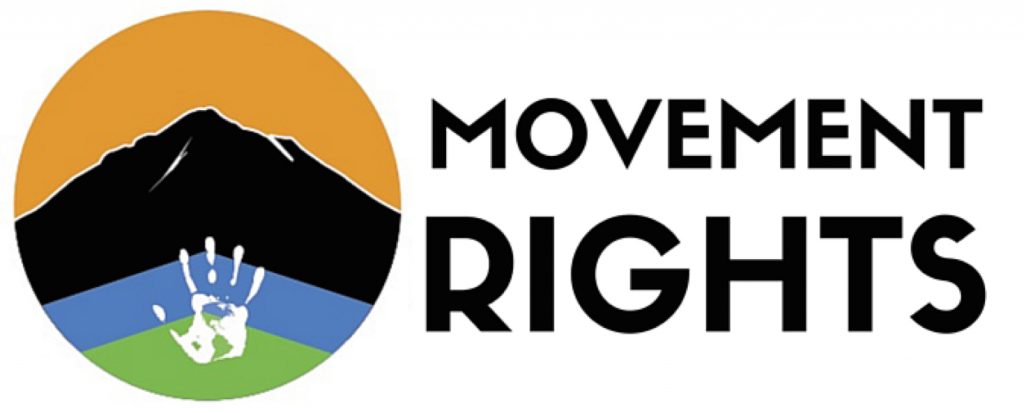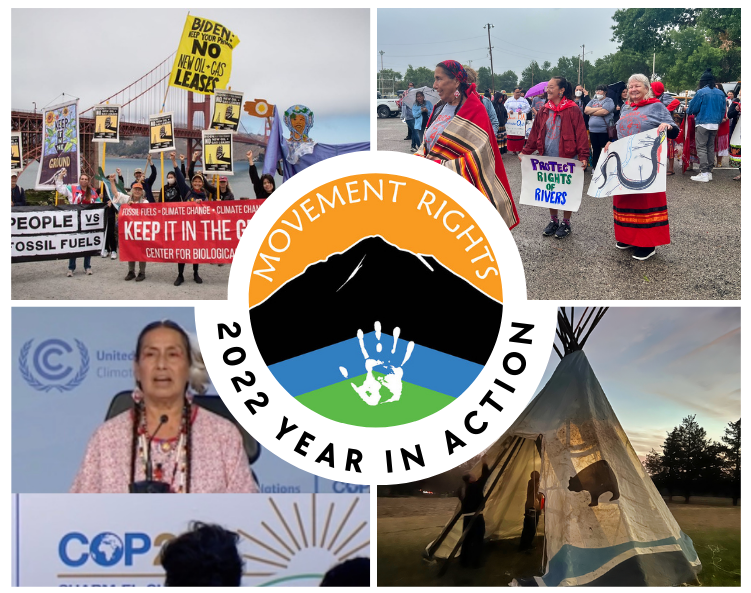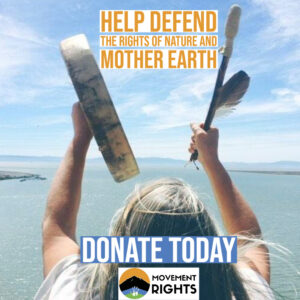By Shannon Biggs and Pennie Opal Plant, co-founders, Movement Rights
Movement Rights is an intentionally small, Indigenous and women-led organization, focusing on three pillars organizing: frontline-led climate justice, Indigenous Rights, and the Rights of Nature. Despite the resurgence of COVID and the onslaught of severe climate-induced weather across Turtle Island, 2022 was one of Movement Rights’ busiest years. In addition to the highlights shared below, we have laid the groundwork for some big projects taking place in 2023 and beyond. Please stay connected by joining our bi-monthly online newsletter and following us on our website and social media.
 Ponca Tribe Recognizes Rights of Rivers: Ponca Chairman Oliver Littlecook said, “Politicians and Big Oil call it ‘economic progress’. The Ponca call it ‘environmental genocide’. We can do better for our communities without sacrificing the water.” The Ponca tribe of Oklahoma again made history by passing a new tribal statute recognizing the “Immutable Rights of Rivers” for two rivers and other water bodies flowing through Ponca territory. It was unanimously adopted July 6, 2022. Movement Rights was pleased to support this effort with legal, organizing, training and media support. As Ponca Environmental Ambassador and Movement Rights’ board member, Casey Camp Horinek, told Indian Country Today and other media outlets, “This is just another step in protecting the sacred waters which are the life sources of all things on Mother Earth, not just for our tribe. We have so much to learn from our waters, everything upstream impacts everything downstream, we are all connected.”
Ponca Tribe Recognizes Rights of Rivers: Ponca Chairman Oliver Littlecook said, “Politicians and Big Oil call it ‘economic progress’. The Ponca call it ‘environmental genocide’. We can do better for our communities without sacrificing the water.” The Ponca tribe of Oklahoma again made history by passing a new tribal statute recognizing the “Immutable Rights of Rivers” for two rivers and other water bodies flowing through Ponca territory. It was unanimously adopted July 6, 2022. Movement Rights was pleased to support this effort with legal, organizing, training and media support. As Ponca Environmental Ambassador and Movement Rights’ board member, Casey Camp Horinek, told Indian Country Today and other media outlets, “This is just another step in protecting the sacred waters which are the life sources of all things on Mother Earth, not just for our tribe. We have so much to learn from our waters, everything upstream impacts everything downstream, we are all connected.”
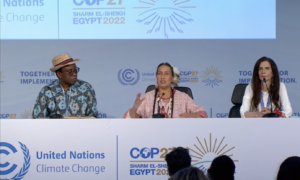 UN COP 27 (EGYPT) Press Conference & Report on Redefining Global Climate Solutions: As UN Chief António Guterres dramatically warned leaders on Day One of the COP 27 climate negotiations, the world is on the “highway to climate hell.” Rights of Nature advocates Movement Rights, WECAN, GARN and the Eco Jurisprudence Monitor held a press conference (watch recording here) at the UN Climate Summit to share a report that points out the fundamental problem may lie within the framework of the UNFCCC process itself. As Nnimmo Bassey, prominent Nigerian environmental activist and director of the ecological think tank Health of Mother Earth Foundation said,“In 2010, in Cochabamba, Bolivia the [Universal Declaration on the Rights of Mother Earth] was adopted by the global community in just over 2 days. The difference at the Conference of Parties—or Conference of Polluters, every year it is a [convening] to avoid action.
UN COP 27 (EGYPT) Press Conference & Report on Redefining Global Climate Solutions: As UN Chief António Guterres dramatically warned leaders on Day One of the COP 27 climate negotiations, the world is on the “highway to climate hell.” Rights of Nature advocates Movement Rights, WECAN, GARN and the Eco Jurisprudence Monitor held a press conference (watch recording here) at the UN Climate Summit to share a report that points out the fundamental problem may lie within the framework of the UNFCCC process itself. As Nnimmo Bassey, prominent Nigerian environmental activist and director of the ecological think tank Health of Mother Earth Foundation said,“In 2010, in Cochabamba, Bolivia the [Universal Declaration on the Rights of Mother Earth] was adopted by the global community in just over 2 days. The difference at the Conference of Parties—or Conference of Polluters, every year it is a [convening] to avoid action.
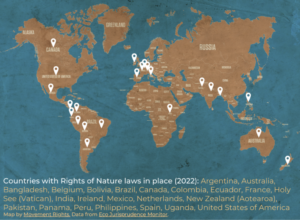 The report, “Rights of Nature: Redefining Global Climate Solutions & Environmental Protection for Systemic Change” also points to the progress being made by the fast-growing global movement for the Rights of Nature, now law in over 20 countries worldwide. It defines legal, enforceable rights for ecosystems to exist, flourish, and regenerate their natural capacities. When implemented, these laws have been used to stop fossil fuel extraction, mining, dams, and other harmful development projects that will ensure we cannot meet targets to stop the worst impacts of catastrophic climate change and mass extinction. To showcase the power and potential of the Rights of Nature, the report outlines what has been accomplished in just the last two years as more and more nations consider a rights-based approach to environmental protection.
The report, “Rights of Nature: Redefining Global Climate Solutions & Environmental Protection for Systemic Change” also points to the progress being made by the fast-growing global movement for the Rights of Nature, now law in over 20 countries worldwide. It defines legal, enforceable rights for ecosystems to exist, flourish, and regenerate their natural capacities. When implemented, these laws have been used to stop fossil fuel extraction, mining, dams, and other harmful development projects that will ensure we cannot meet targets to stop the worst impacts of catastrophic climate change and mass extinction. To showcase the power and potential of the Rights of Nature, the report outlines what has been accomplished in just the last two years as more and more nations consider a rights-based approach to environmental protection.
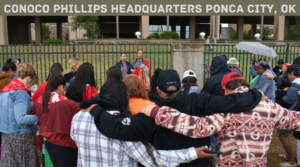 The first Regional Indigenous Convening of the 4 Winds, “Listening to the Waters Speak”: The rivers connect us all. Over the next 2+ years, along with tribal communities and many allies we will be gathering in community and ceremony on different tribal lands representing the 4 Directions, coming together to reciprocate strategies and resiliency and above all protect the waters.
The first Regional Indigenous Convening of the 4 Winds, “Listening to the Waters Speak”: The rivers connect us all. Over the next 2+ years, along with tribal communities and many allies we will be gathering in community and ceremony on different tribal lands representing the 4 Directions, coming together to reciprocate strategies and resiliency and above all protect the waters.
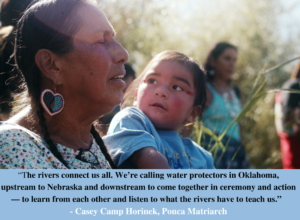
The first Convening of the 4 Winds was hosted by the Ponca Tribe of Oklahoma on their territory on the Fall Equinox 2022. The Ponca shared their Rights of Rivers strategy as they face fossil fuels and other Indigenous frontline communities shared their strategies. See short event video here, blog here, photo gallery here, and local media. More than 100 participants traveled from the region and beyond, representing the struggles from their communities or tribal territories such as cap and trade, desecration of sacred sites, Missing and Murdered Indigenous Women (MMIW), refineries, fracking and pipelines. On Day One, we held ceremony, heard water testimonies and shared strategies. Members of the IkiyA Collective walked us through protocols on ensuring a safe non-violent direct action as we prepared to walk to the headquarters of ConocoPhillips and the refinery on Day Two. We are excited that members of the Cherokee Nation have taken the baton to host the next Convening of the 4 Winds in their territory on Earth Day 2023, and we look forward to supporting this gathering and sharing details on our website soon.
 Listening to the Waters Speak—Indigenous Water Testimony Video Series: Only 3% of all water on Earth is fresh water. The same fresh water from the beginning of time has recycled and given life to all our ancestors and present day relatives of all species. Most of that fresh water is locked in melting ice caps, so the water that is accessible to us must remain pure and intact. Water is life. Begun at the first Convening of the 4 Winds, and continuing, our media team is recording water protectors sharing their views on the sacred water in their territories, and what the water is telling them about what we as humans must do. These impromptu videos tell an important story. Videos now available include: Lucille Contreras of the Texas Tribal Buffalo Project; Isabella Zizi (Northern Cheyenne, Arikara and Muskogee Creek Nations) living on occupied Ohlone territory in Richmond, CA; Matilde Torres, Indigenous San Antonio River water protector; and Dr. Crystal Cavalier Keck (Ocaneechi band of the Saponi Nation) protecting the Haw River in North Carolina. Many more testimonies to come in the months ahead.
Listening to the Waters Speak—Indigenous Water Testimony Video Series: Only 3% of all water on Earth is fresh water. The same fresh water from the beginning of time has recycled and given life to all our ancestors and present day relatives of all species. Most of that fresh water is locked in melting ice caps, so the water that is accessible to us must remain pure and intact. Water is life. Begun at the first Convening of the 4 Winds, and continuing, our media team is recording water protectors sharing their views on the sacred water in their territories, and what the water is telling them about what we as humans must do. These impromptu videos tell an important story. Videos now available include: Lucille Contreras of the Texas Tribal Buffalo Project; Isabella Zizi (Northern Cheyenne, Arikara and Muskogee Creek Nations) living on occupied Ohlone territory in Richmond, CA; Matilde Torres, Indigenous San Antonio River water protector; and Dr. Crystal Cavalier Keck (Ocaneechi band of the Saponi Nation) protecting the Haw River in North Carolina. Many more testimonies to come in the months ahead.
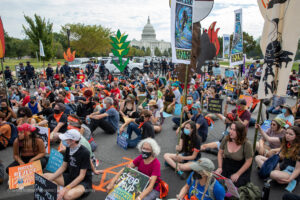 People VS Fossil Fuels Coalition (PVFF): We are proud to serve on the steering and organizing committees of the 1,200 organizations strong, climate frontline and indigenous led PVFF coalition. Through this coalition we lift up frontline led fossil fuel struggles and demand Biden declare a climate emergency, and mobilize to keep pressure on elected officials including working to stop Senator Manchin’s Dirty Deal. In 2022 People vs. Fossil Fuels groups organized in-district actions, D.C. rallies, letters to the editor, press calls, and events with Members of Congress in Washington to oppose the plan. The coalition also drove thousands of phone calls to Congress urging members to oppose the deal. And while we exerted pressure that helped stop the Dirty Deal three times, there’s more to do. As attention shifts to President Biden’s authority to confront the climate crisis in 2023, the coalition will continue escalating pressure for him to use his power as president to stop fossil fuel expansion and declare a climate emergency.
People VS Fossil Fuels Coalition (PVFF): We are proud to serve on the steering and organizing committees of the 1,200 organizations strong, climate frontline and indigenous led PVFF coalition. Through this coalition we lift up frontline led fossil fuel struggles and demand Biden declare a climate emergency, and mobilize to keep pressure on elected officials including working to stop Senator Manchin’s Dirty Deal. In 2022 People vs. Fossil Fuels groups organized in-district actions, D.C. rallies, letters to the editor, press calls, and events with Members of Congress in Washington to oppose the plan. The coalition also drove thousands of phone calls to Congress urging members to oppose the deal. And while we exerted pressure that helped stop the Dirty Deal three times, there’s more to do. As attention shifts to President Biden’s authority to confront the climate crisis in 2023, the coalition will continue escalating pressure for him to use his power as president to stop fossil fuel expansion and declare a climate emergency.
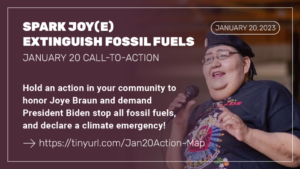 Honoring Water Protector, pipeline fighter and beloved relative, Joye Braun: In November 2022, our movements and our world lost Joye Braun, a true warrior and force of nature. Through an invitation from her daughter, Movement Rights, PVFF, tribal communities and allies everywhere are calling water protectors across Turtle Island to take action in Joye’s honor on January 20th 2023 – which is not only Biden’s second anniversary in office, but Joye’s birthday and the second anniversary of the end of the Keystone XL pipeline. She was also Movement Rights’ dear friend, relative, and co-conspirator—helping to dream and bring to life the Convening of the 4 Winds, which she attended with her daughter, Morgan Brings Plenty in September 2023. She was an amazing strategist and organizer at Standing Rock, as the IEN Pipeline Organizer, and on the steering committee of the People VS Fossil Fuels Network. From Hawaii to New York, over 20 actions are planned for January 20, 2023 including one Movement Rights is helping to organize in San Francisco calling on Biden to declare a climate emergency. She will be forever missed and never forgotten.
Honoring Water Protector, pipeline fighter and beloved relative, Joye Braun: In November 2022, our movements and our world lost Joye Braun, a true warrior and force of nature. Through an invitation from her daughter, Movement Rights, PVFF, tribal communities and allies everywhere are calling water protectors across Turtle Island to take action in Joye’s honor on January 20th 2023 – which is not only Biden’s second anniversary in office, but Joye’s birthday and the second anniversary of the end of the Keystone XL pipeline. She was also Movement Rights’ dear friend, relative, and co-conspirator—helping to dream and bring to life the Convening of the 4 Winds, which she attended with her daughter, Morgan Brings Plenty in September 2023. She was an amazing strategist and organizer at Standing Rock, as the IEN Pipeline Organizer, and on the steering committee of the People VS Fossil Fuels Network. From Hawaii to New York, over 20 actions are planned for January 20, 2023 including one Movement Rights is helping to organize in San Francisco calling on Biden to declare a climate emergency. She will be forever missed and never forgotten.
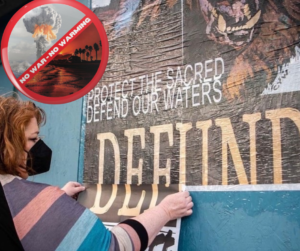 Bridging the Nuclear- and Fossil-Free Movements through Divestment: While the climate crisis grows more disruptive daily, some of the hard-won gains by anti-fossil fuel activists are being circumvented through false solution schemes such as carbon trading, “net zero”, a steep rise in the buildup of nuclear power and renewed threats of nuclear war. As public pressure builds around the role of fossil fuels in driving climate catastrophe, the nuclear industry has quietly gained footing marketing itself as a no-carbon, clean energy alterative. This despite the fact that nuclear power itself relies heavily on fossil fuels to grind land, extract, and process uranium through four energy-intensive steps. Both the anti-nuclear movement and the anti-fossil fuels movements have robust divestment campaigns, but seldom coordinate. Significantly, they are targeting many of the very same banks, investment firms, colleges, and insurers. Led by co-founder Pennie Opal Plant, in 2022 we began a series of strategy meetings with leaders in the anti-nuclear movement exploring the potential of collaborative engagements with colleagues in the fossil fuel divestment movement. We are excited to share more as the process moves along.
Bridging the Nuclear- and Fossil-Free Movements through Divestment: While the climate crisis grows more disruptive daily, some of the hard-won gains by anti-fossil fuel activists are being circumvented through false solution schemes such as carbon trading, “net zero”, a steep rise in the buildup of nuclear power and renewed threats of nuclear war. As public pressure builds around the role of fossil fuels in driving climate catastrophe, the nuclear industry has quietly gained footing marketing itself as a no-carbon, clean energy alterative. This despite the fact that nuclear power itself relies heavily on fossil fuels to grind land, extract, and process uranium through four energy-intensive steps. Both the anti-nuclear movement and the anti-fossil fuels movements have robust divestment campaigns, but seldom coordinate. Significantly, they are targeting many of the very same banks, investment firms, colleges, and insurers. Led by co-founder Pennie Opal Plant, in 2022 we began a series of strategy meetings with leaders in the anti-nuclear movement exploring the potential of collaborative engagements with colleagues in the fossil fuel divestment movement. We are excited to share more as the process moves along.
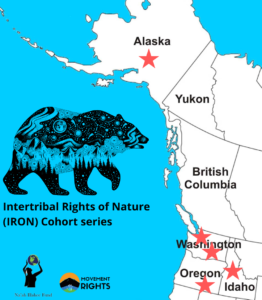 Exploring Indigenous Rights of Nature in the Pacific Northwest: Movement Rights was honored to partner with the Na’ah Illahee Fund (NIF) to create and moderate a 9-month biweekly Intertribal Rights of Nature cohort series. Na’ah Illahee means “Mother Earth” in the Chinook Wawa language. Through their Trust-based philanthropy model, NIF selected five Indigenous-led projects/groups in Alaska, Oregon, Idaho and Washington state, who were each awarded $25,000 grants to participate and further their work. Through many months together the groups met Indigenous Rights of Nature leaders and advocates from across Turtle Island and internationally. They were also introduced to many approaches from Land Back to Indigenous Inherent Responsibilities, Land Rematriation, climate justice and more to explore the differences between and commonalities with Rights of Nature as an approach to protect tribal lands, waters, species and urban areas. Primarily hosted by Movement Rights co-founders and Casey Camp Horinek, high profile speakers included Krystal Two Bulls, Kelsey Leonard, Crystal Cavalier Keck, Deon Ben, and resource organizations including the Global Alliance for the Rights of Nature, Earth Law Center, and Bioneers Indigeneity program. We look forward to continuing and expanding this program in the year ahead.
Exploring Indigenous Rights of Nature in the Pacific Northwest: Movement Rights was honored to partner with the Na’ah Illahee Fund (NIF) to create and moderate a 9-month biweekly Intertribal Rights of Nature cohort series. Na’ah Illahee means “Mother Earth” in the Chinook Wawa language. Through their Trust-based philanthropy model, NIF selected five Indigenous-led projects/groups in Alaska, Oregon, Idaho and Washington state, who were each awarded $25,000 grants to participate and further their work. Through many months together the groups met Indigenous Rights of Nature leaders and advocates from across Turtle Island and internationally. They were also introduced to many approaches from Land Back to Indigenous Inherent Responsibilities, Land Rematriation, climate justice and more to explore the differences between and commonalities with Rights of Nature as an approach to protect tribal lands, waters, species and urban areas. Primarily hosted by Movement Rights co-founders and Casey Camp Horinek, high profile speakers included Krystal Two Bulls, Kelsey Leonard, Crystal Cavalier Keck, Deon Ben, and resource organizations including the Global Alliance for the Rights of Nature, Earth Law Center, and Bioneers Indigeneity program. We look forward to continuing and expanding this program in the year ahead.
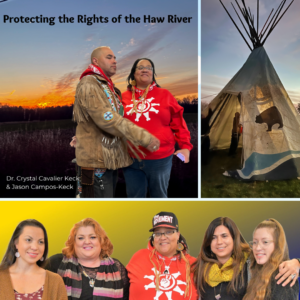 Supporting 7 Directions of Service to recognize the Rights of the Haw River (NC): Movement Rights was thrilled to join Dr. Crystal Cavalier Keck (Occaneechi Band of the Saponi Nation and founder of the Missing Murdered Indigenous Coalition of North Carolina) and 7 Generations of Service in Mebane, North Carolina December 16 & 17) for their public launch of the Rights of the Haw River campaign that includes introducing a state Bill for the Rights of the Haw River and efforts to pass tribal laws protecting the Rights of the Haw River. We were honored to be invited to a special Bear Ceremony on their traditional lands and look forward to supporting their exciting tribal and statewide campaigns. More news to come soon.
Supporting 7 Directions of Service to recognize the Rights of the Haw River (NC): Movement Rights was thrilled to join Dr. Crystal Cavalier Keck (Occaneechi Band of the Saponi Nation and founder of the Missing Murdered Indigenous Coalition of North Carolina) and 7 Generations of Service in Mebane, North Carolina December 16 & 17) for their public launch of the Rights of the Haw River campaign that includes introducing a state Bill for the Rights of the Haw River and efforts to pass tribal laws protecting the Rights of the Haw River. We were honored to be invited to a special Bear Ceremony on their traditional lands and look forward to supporting their exciting tribal and statewide campaigns. More news to come soon.
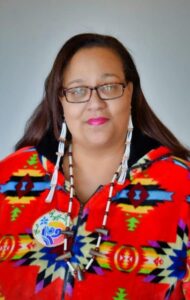 Announcing our New Board Member, Dr. Crystal Cavalier Keck: Movement Rights operates in a unique way by ensuring that our board is 100% Indigenous, and that our frontline projects are led by those who authentically represent the communities where we work. As we begin to work more closely with those working to protect the Rights of the Haw River at state and tribal levels, it is our honor to have Dr. Crystal Cavalier Keck (Ocaneechi Band of the Saponi Nation in Burlington, NC) join our board, and ensure that our work is guided by and supports the work she is leading on behalf of the River, as well as her incredible work for MMIW and to stop the MVP pipeline. She is a board member of the Haw River Assembly, the Women’s Resource Center and Benevolence Farm. Crystal was a Fall Cohort of the Sierra Club’s Gender Equity and Environment Program and Women’s Earth Alliance (WEA) Accelerator for Grassroots Women Environmental Leaders in 2020. Crystal completed her Doctorate in Organization Leadership at the University of Dayton in August 2022, and her dissertation focused on the Social Justice issue of Missing Murdered Indigenous Women in Gas/Oil Pipelines in frontline communities. Her current projects focus on missing, murdered indigenous women, burden, exposure, risk, and health disparities among American Indians in environmental justice communities. Crystal calls Four Sacred Rivers home, the Haw River, Eno River, Dan River and Roanoke River. Currently, she is working on protecting the Haw River, as it is 5 miles from her, as it has been deemed one of the country’s most endangered rivers by the conservation group American Rivers. Finally, Crystal is working on inequities in our food system, which continue to disproportionately burden communities of color. Dismantling these inequities is imperative to achieve a sustainable food system and ultimately food justice. We are honored to have her leadership on our board.
Announcing our New Board Member, Dr. Crystal Cavalier Keck: Movement Rights operates in a unique way by ensuring that our board is 100% Indigenous, and that our frontline projects are led by those who authentically represent the communities where we work. As we begin to work more closely with those working to protect the Rights of the Haw River at state and tribal levels, it is our honor to have Dr. Crystal Cavalier Keck (Ocaneechi Band of the Saponi Nation in Burlington, NC) join our board, and ensure that our work is guided by and supports the work she is leading on behalf of the River, as well as her incredible work for MMIW and to stop the MVP pipeline. She is a board member of the Haw River Assembly, the Women’s Resource Center and Benevolence Farm. Crystal was a Fall Cohort of the Sierra Club’s Gender Equity and Environment Program and Women’s Earth Alliance (WEA) Accelerator for Grassroots Women Environmental Leaders in 2020. Crystal completed her Doctorate in Organization Leadership at the University of Dayton in August 2022, and her dissertation focused on the Social Justice issue of Missing Murdered Indigenous Women in Gas/Oil Pipelines in frontline communities. Her current projects focus on missing, murdered indigenous women, burden, exposure, risk, and health disparities among American Indians in environmental justice communities. Crystal calls Four Sacred Rivers home, the Haw River, Eno River, Dan River and Roanoke River. Currently, she is working on protecting the Haw River, as it is 5 miles from her, as it has been deemed one of the country’s most endangered rivers by the conservation group American Rivers. Finally, Crystal is working on inequities in our food system, which continue to disproportionately burden communities of color. Dismantling these inequities is imperative to achieve a sustainable food system and ultimately food justice. We are honored to have her leadership on our board.
Thank you from Movement Rights.
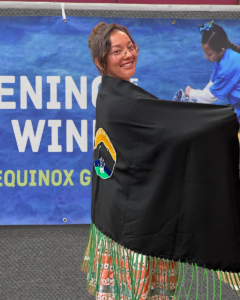 Movement Rights is founded on the idea that we must align human law (and culture) with the laws of the natural world—the future of humanity depends on it. Since our inception in December 2014, we have established our work as a vital and respected piece of the climate justice mosaic. We know no single part of our movements for justice can win on its own—we believe in the power of frontline leadership and true solidarity, sharing and integrating strategies, tactics, resources and learning from each other. We are strategically small, because it allows us to support the communities we work with in ways that ensure the leadership and our resources stay with and empower them. While we are proud of our many accomplishments, one of the benefits of our size is that we do not need to focus on branding our work, which allows us some freedom to work in quiet ways when it serves the greater good.
Movement Rights is founded on the idea that we must align human law (and culture) with the laws of the natural world—the future of humanity depends on it. Since our inception in December 2014, we have established our work as a vital and respected piece of the climate justice mosaic. We know no single part of our movements for justice can win on its own—we believe in the power of frontline leadership and true solidarity, sharing and integrating strategies, tactics, resources and learning from each other. We are strategically small, because it allows us to support the communities we work with in ways that ensure the leadership and our resources stay with and empower them. While we are proud of our many accomplishments, one of the benefits of our size is that we do not need to focus on branding our work, which allows us some freedom to work in quiet ways when it serves the greater good.
We are in the streets, in the news and in the courts, providing research and reports, convening strategic gatherings large and small, speaking at the UN, community meetings, regulatory hearings, and more. We work with national and global climate allies, sovereign Indigenous nations and communities. We have helped thousands of people connect the dots between the critical time we find ourselves in and the solutions that Indigenous people have always known: human activity must take place within the natural system of laws that govern life on Earth. Please consider donating to support our work, visiting our website, following us on Twitter, Instagram Youtube and Facebook, and subscribing to our online newsletter.
